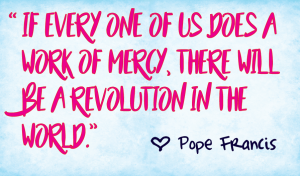 The virtue of the month for Challenge and Conquest in December is hard work. This may seem like an odd virtue for the month of Advent and Christmas but it actually is quite appropriate. St Joseph is known as the patron saint of workers. Mary worked hard throughout her whole life as a mother, raising Jesus. It was not easy for either Mary or Joseph to follow God’s will during Christmas, but they did. Jesus chose to become man and part of that was taking on the need to work. He helped Joseph as a carpenter and did not shy away from long hours of walking to preach the gospel. The Holy Family are wonderful examples of living the virtue of hard work.
The virtue of the month for Challenge and Conquest in December is hard work. This may seem like an odd virtue for the month of Advent and Christmas but it actually is quite appropriate. St Joseph is known as the patron saint of workers. Mary worked hard throughout her whole life as a mother, raising Jesus. It was not easy for either Mary or Joseph to follow God’s will during Christmas, but they did. Jesus chose to become man and part of that was taking on the need to work. He helped Joseph as a carpenter and did not shy away from long hours of walking to preach the gospel. The Holy Family are wonderful examples of living the virtue of hard work.
Nothing comes easy, and behind every success are hours of plain hard work. If we want to be successful and reach any goal there is a price and it does not come easy. That price is hard work dedication, and the determination that whether we win or lose, we have applied the best of ourselves to what we are trying to achieve. Pope Paul VI once said “All life demands struggle. Those who have everything given to them become lazy, selfish, and insensitive to the real values of life. The very striving and hard work that we so constantly try to avoid is the major building block in the person we are today.”
The back of the holy card for Challenge this month has the Student’s prayer on it. Being a student is hard work but it is God’s will for every single teenager. The prayer says ” Loving Father, I stand before You in the midst of confusion and complexities of life. My future sometimes seems distant and unknown. Give me, Lord, the vision to see the path You set before me. Grant me the courage to follow Your way, that through the gifts and talents You have given me, I may bring Your life and Your love to others.
 Jesus spoke about hard work many times in the gospel, like for example in the parable of the talents. That passage to speaks about dedication and doing what is asked of you. Obedience is part of hard work and dedication and we know how serious Jesus took obeying his Father. Jesus also speaks to his apostles about the fact that God will never ask more than you can handle. So if he is asking or inspiring you to do something hard, he will give you the strength to handle it. If we have been given many talents or generous hearts then God will ask us to use them and be responsible for helping other people with those talents. Jesus talks about procrastination and putting off doing what we are asked. That does not please God and Jesus warns us that we never know how much time we have to do something. Don’t put off to tomorrow, what you can do today. Talents are like gifts that God gives us. They are not just human talents like play the piano or being a great long distance runner. Talents (or this money in this passage) is symbolic of gifts and graces that God gives us each day and in our lives. He puts them in our hands so we can use them to help others in this world. Sometimes using our talents takes hard work but as Jesus points out in this passage, that hard work and dedication will pay off.
Jesus spoke about hard work many times in the gospel, like for example in the parable of the talents. That passage to speaks about dedication and doing what is asked of you. Obedience is part of hard work and dedication and we know how serious Jesus took obeying his Father. Jesus also speaks to his apostles about the fact that God will never ask more than you can handle. So if he is asking or inspiring you to do something hard, he will give you the strength to handle it. If we have been given many talents or generous hearts then God will ask us to use them and be responsible for helping other people with those talents. Jesus talks about procrastination and putting off doing what we are asked. That does not please God and Jesus warns us that we never know how much time we have to do something. Don’t put off to tomorrow, what you can do today. Talents are like gifts that God gives us. They are not just human talents like play the piano or being a great long distance runner. Talents (or this money in this passage) is symbolic of gifts and graces that God gives us each day and in our lives. He puts them in our hands so we can use them to help others in this world. Sometimes using our talents takes hard work but as Jesus points out in this passage, that hard work and dedication will pay off.
 The Youcat number of the month is all about how hard work is important to our faith. #444 What does the Church’s social doctrine say about the topics of labor and unemployment? To work is a duty that God has given to us. In a common effort we are supposed to look after and continue his work of creation. “The Lord God took the man and put him in the garden of Eden to till it and keep it” (Gen 2:15). For most people, work is the foundation of life. While today many people who would like to work find no jobs, there are also “workaholics” who work so much that they have no time left for God and their fellowmen. And while many people can scarcely feed themselves and their families with their wages, others earn so much that they can live a life of unimaginable luxury. Work is not an end in itself but should serve the development of a humane society. That is why Catholic social teaching is committed to an economic order in which all men can collaborate actively and share in the prosperity that is achieved. It insists on a just wage that enables all to have a dignified existence, and it calls on the rich to practice the virtues of moderation, solidarity, and sharing
The Youcat number of the month is all about how hard work is important to our faith. #444 What does the Church’s social doctrine say about the topics of labor and unemployment? To work is a duty that God has given to us. In a common effort we are supposed to look after and continue his work of creation. “The Lord God took the man and put him in the garden of Eden to till it and keep it” (Gen 2:15). For most people, work is the foundation of life. While today many people who would like to work find no jobs, there are also “workaholics” who work so much that they have no time left for God and their fellowmen. And while many people can scarcely feed themselves and their families with their wages, others earn so much that they can live a life of unimaginable luxury. Work is not an end in itself but should serve the development of a humane society. That is why Catholic social teaching is committed to an economic order in which all men can collaborate actively and share in the prosperity that is achieved. It insists on a just wage that enables all to have a dignified existence, and it calls on the rich to practice the virtues of moderation, solidarity, and sharing
